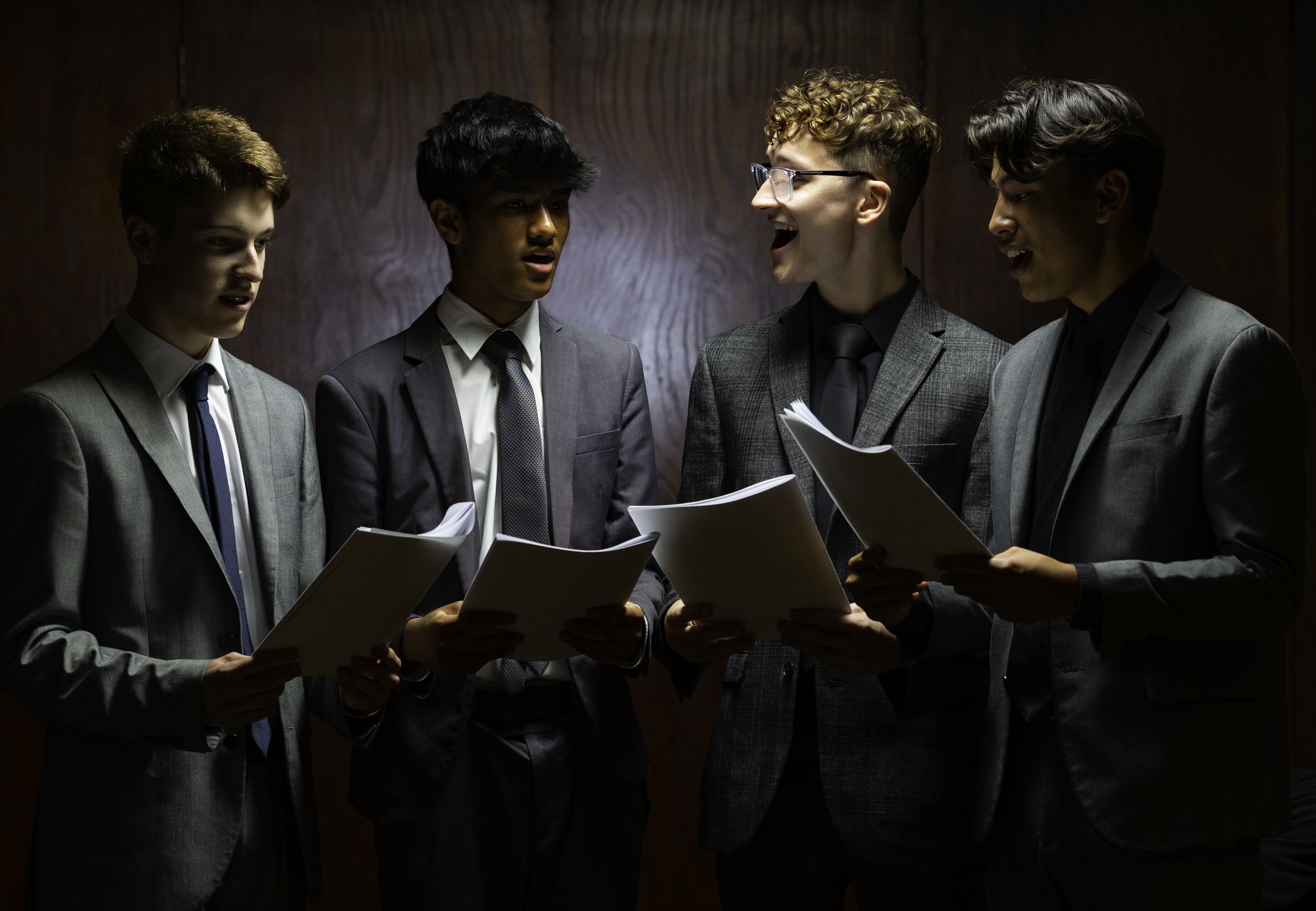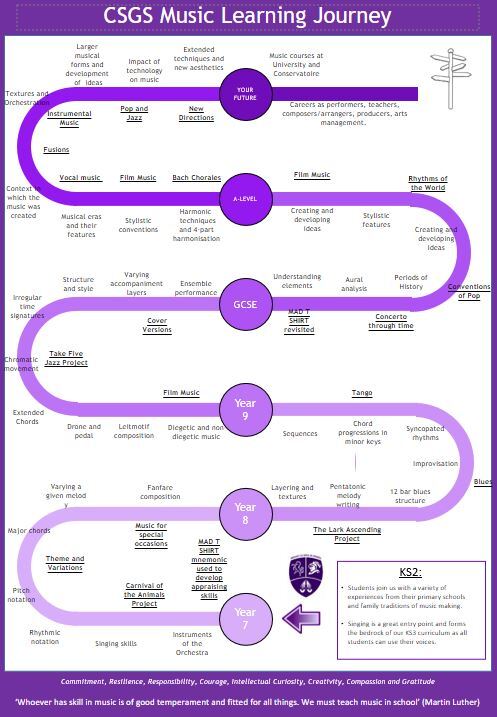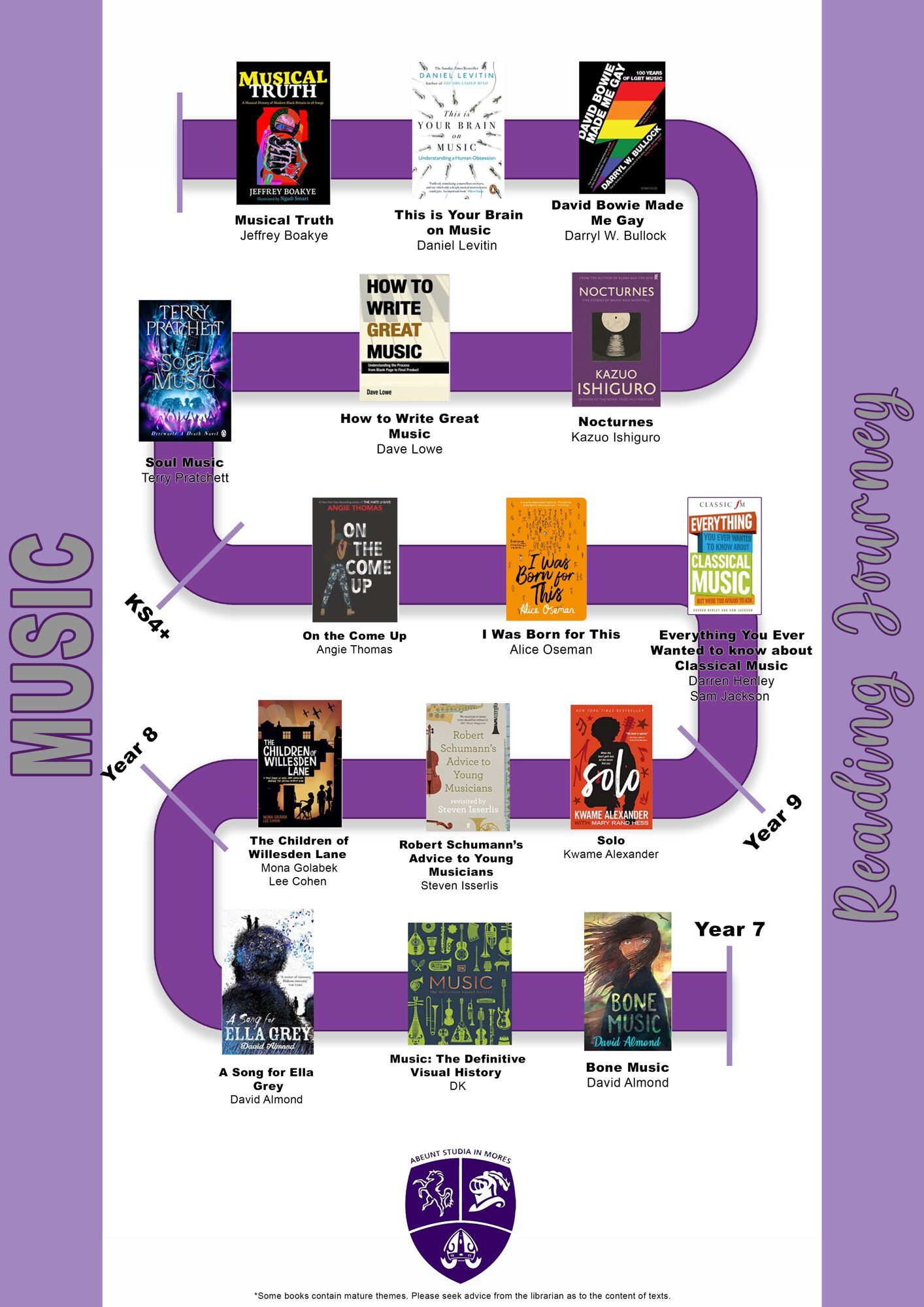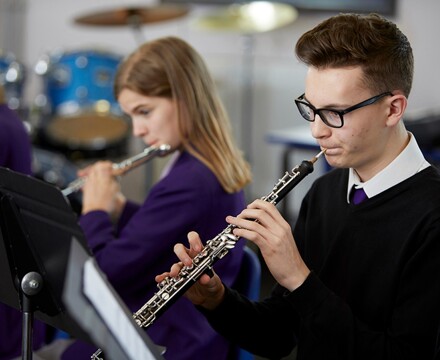- Home
- Academic Excellence
- Subject Information
- Music
Music

Curriculum Vision
Music is at once the product of feeling and knowledge, for it requires from its students, composers and performers alike, not only talent and enthusiasm, but also that knowledge and perception which are the result of protracted study and reflection.
Alban Berg, Composer
Over their seven years at CSGS, our young musicians become increasingly confident and expressive in performance, purposeful and inventive in composition, and develop a sophisticated appreciation of music as listeners. By interacting with a carefully curated range of stimulus material across diverse styles, genres and time periods, students' aural awareness becomes increasingly sophisticated, and they develop the ability to speak with both passion and a deep understanding about the music they play, compose and hear.
We equip students with the knowledge and skills necessary for music to play a positive part in the rest of their lives, whether they choose to pursue music as a career path, to engage in Britain’s vibrant culture of amateur music-making which proves to be life-enhancing for so many, or as the discerning listeners and concert-goers of the future.
The music department’s myriad extra-curricular ensembles form a welcoming and diverse community, in which new students of many different backgrounds, levels of experience, and interest find their place each year. Friendships flourish across year groups, and the collective endeavour of working towards high-quality performances creates what are often among the most positive and lasting memories of students’ time at school.
Please visit the site below for links to our latest rehearsals and performances. linktr.ee/csgsmusic
Curriculum Learning Journey

Curriculum Reading Journey

Key Stage 3
Bone Music – David Almond
Music: The Definitive History – DK
A song for Ella Grey – David Almond
The Children of Willesden Lake – Mona Golabek, Lee Cohen
Robert Schumann’s Advice to Young Musician – Steven Isserlis
Solo – Kwame Alexander
Key Stage 4
Big Bangs: The Story of Five Discoveries That Changes Musical Hsitory – Howard Goodall
The Story of Music – Howard Goodall
Everything You Ever Wanted to know about Classical Music – Darren Henley, Sam Jackson
I was Born for This – Alice Oseman
On the Come Up – Angie Thomas
Key Stage 5
Soul Music – Terry Pratchett
How to Write Great Music – David Lowe
Nocturnes – Kazuo Ishiguro
David Bowie Made me Gay – Darryl W. Bullock
This is Your Brain on Music – Daniel Levitin
Music: A Very Short Introduction – Nicholas Cook
Musical Truth – Jeffrey Boakye
A Short History of Western Music – J.D. Grout
Summary of Study at each Key Stage
We treat all students as musicians. The simple over-arching of music at Chis and Sid for our students to make music, to think musically and become more musical. Developing an appreciation of quality, whether that be as performers, composers or informed listeners is paramount - our aim is for our students to become musical connoisseurs. We achieve this through creative, practical exploration of sounds and music. We are not talking passive ‘musical appreciation’, but rather about understanding and getting to know how music works, and how it therefore conveys meaning. In particular, we seek to develop in students an openness to experiencing and exploring music that is new to them.
There is also a real synergy between the taught curriculum and the myriad extra-curricular musical opportunities available to students, and we make links explicit links between classroom topics and extra-curricular opportunities so students can appreciate their connectedness.
Key Stage 3
All lessons are taught in small groups of 16 students, allowing for bespoke teaching which can adapt closely to students’ needs. Singing is the bedrock of all our work and all lessons begin in song. Students learn to be comfortable using their voices, developing increasing technical control, and singing melody and harmony parts of increasing complexity as they progress through KS3. We also help students navigate their changing voices, with carefully pitched repertoire.
Lessons explore the technical and expressive aspects of music as students engage with stimulus material from great musical works and develop their understanding of both the technical and expressive aspects of music, through carefully curated performance, composition and listening activities.
Topics studied include Classical Music, Blues, Jazz, Tango, Folk, Musical Fusions, and Music for Film.
Key Stage 4
OCR GCSE Music
Students follow the OCR GCSE Specification which bridges the gap well between KS3 music and GCSE. Students perform, compose and learn to critically analyse music. The course explores the development of classical music through the prism of the concerto, looks at the characteristics of several decades of pop music, how music for film can evoke particular moods, and in the ‘rhythms of the world’ unit, takes a tour of music from Latin America, the Caribbean, the Mediterranean and India.
Key Stage 5
Pearson Edexcel A-level Music
Edexcel A-level music, one of the most rigorous specifications available which retains traditional elements such as Bach Chorale harmony. This suits our highly able students, including those who aspire to Oxbridge music degrees and conservatoire courses.
The content builds on the understanding developed at KS4. Students investigate, analyse and evaluate music and its features across areas of study including vocal, and instrumental music, in popular, classical and jazz styles. Thirteen set works enable students to conduct in depth studies into different musical styles and genres, and place these within a wider context. Students learn to perform, compose and appreciate different types of music, developing critical and creative thinking, cultural, aesthetic and emotional awareness, and the ability to make music individually and as part of a group.
Opportunities Beyond the Classroom
The music department at ‘Chis and Sid’ is a welcoming and diverse community, in which new students of many different backgrounds, levels of experience, and interest find their place each year. Each week, well over 100 students take part in a range of teacher-led choral and instrumental ensembles, including Chamber, Senior and Junior choirs, Jazz Band, Orchestra, Flute, Guitar and Ukulele ensembles, and the department is buzzing with the sound of student bands and soloists rehearsing before and after school, and during breaktimes. Each year, the precise tapestry of extra-curricular activities evolves to meet student needs and interests, a recent example of which being the ‘consort choir’, initiated by a group of sixth formers with an interest in Renaissance polyphony.
Key Stage 3
Several lunchtime activities (Junior choir, Ukulele ensemble and Micro-jazz) are specifically targeted at students in years 7, 8 and 9 and students are more experienced musicians are encouraged to take part in all-age activities after school, including chamber choir and orchestra.
Key Stage 4
We ensure there are attractive opportunities for students in this age group, whether they choose to study music at GCSE or not, and many year 10 and 11 students maintain an active role within the extra-curricular musical life of the school. Precise activities vary from year to year depending on student interests – last year the KS4 showsongs choir was a favourite with students.
Key Stage 5
Sixth form involvement in music is strong, including by musicians who join us in year 12 from other schools. In line with the school’s vision of the learners of today becoming the leaders of tomorrow, sixth form students help to coach our ensembles, compose music for our students to perform, and provide excellent role models for our younger musicians.
